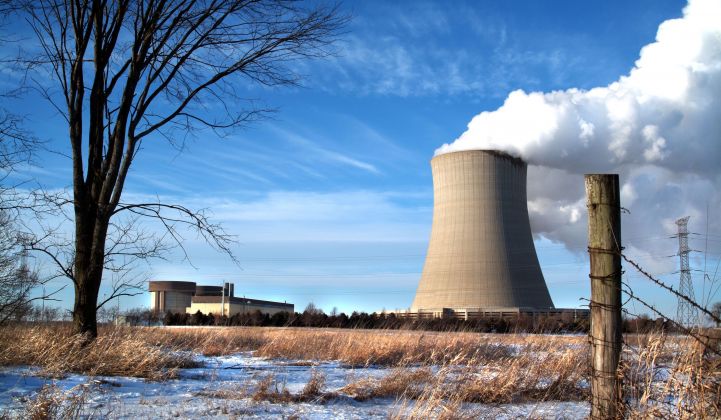Exelon is following through with a threat to close two of its Illinois nuclear power plants by next year unless it receives state support to boost their financial viability, a move that could undermine the state's carbon-free electricity goals.
But with a bribery scandal involving Exelon subsidiary Commonwealth Edison eroding its political clout in the state, and Illinois Governor JB Pritzker saying he won’t support the utility’s preferred plan to boost its nuclear plant revenue, it’s unclear whether Exelon will get what it says it needs to keep the plants open.
Exelon subsidiary Exelon Generation’s announcement that it plans to close its Byron and Dresden power plants in 2021, decades ahead of schedule, cited long-standing economic pressures on a fleet that supplies the vast majority of the state’s carbon-free generation.
The utility also warned that it may seek early retirement of its Braidwood and LaSalle power plants, which combined with closures at the Byron and Dresden plants would increase electricity sector carbon emissions by about 70 percent and undermine Illinois’ progress toward its goal of 85 percent carbon-free energy by 2025.
The announcement was met with strong negative reactions from Illinois state leaders. A Pritzker spokesperson called it a “threat” and noted that two other Exelon nuclear plants in Illinois, the Clinton and Quad Cities plants, receive about $235 million per year in zero-emissions credits created under the state’s 2016 Future Energy Jobs Act.
Exelon has been able to secure zero-emissions credits for nuclear plants in New York and New Jersey, allowing major contributors of carbon-free electricity to keep operating. Both states have aggressive zero-carbon energy policies.
Hurdles for Exelon at the state and federal levels
Last week, Pritzker’s office released a clean energy plan laying out the governor’s preferred path forward for stalled energy legislation, a plan which excludes most of Exelon’s preferred policies to support its nuclear fleet.
Pritzker’s plan would apply strict financial reporting and independent auditing requirements for Exelon’s nuclear fleet before it could seek to extend zero-emissions credits to its other power plants.
In lieu of those supports, the utility proposes a carbon-pricing scheme that could provide incentives for the plants, as well as other carbon-free energy resources. Exelon CEO Chris Crane warned earlier this month that the utility, which owns the country’s largest nuclear generating fleet and operates utilities in Illinois, Maryland, Delaware and Washington, D.C., faced diminishing prospects for keeping its struggling Illinois nuclear fleet running in the face of continued financial losses.
The plan from the governor also moves away from Exelon’s preferred method of creating a Fixed Resource Requirement structure to allow its nuclear power plants to exit the wholesale capacity markets of mid-Atlantic grid operator PJM. Exelon’s nuclear fleet is expected to be unable to compete in PJM’s capacity market under new rules it’s been ordered to create by the Federal Energy Regulatory Commission. Those rules will force state-subsidized resources to use administratively fixed minimum prices when bidding to compete against other resources in the market.
Exelon worked with legislators and environmental groups to include a version of the Fixed Resource Requirement in the Clean Energy Jobs Act legislation introduced last year. However, the bill stalled in 2019 after the federal bribery investigation involving ComEd was announced. CEJA and a rival clean energy bill, dubbed Path to 100, were also unable to advance during this year’s legislative session, which was constrained by the COVID-19 pandemic.
ComEd’s decision in July to pay a $200 million fine and submit to a deferred prosecution agreement in connection to the federal investigation alleging the utility steered jobs, contracts and payments to House Speaker Michael Madigan in exchange for favorable treatment in state legislation has made for a toxic environment in the state capitol.
Pritzker suspended the Energy Working Group involved in crafting state energy legislation after ComEd’s deferred prosecution agreement last month. The energy plan released this week makes it clear that Pritzker views the Fixed Resource Requirement plan as “a sizable windfall for Exelon’s existing nuclear fleet in Illinois" and less appealing than a plan based on a carbon price, stated Rob Rains, an analyst with Washington Analysis, in a research note released this week.
Exelon said its decision to shutter the plants was unrelated to Pritzker's recent announcements.
“We agree with Governor Pritzker that policy reform is urgently needed to address the climate crisis and advance Illinois’ clean energy economy, and we support the objectives of the governor’s recent energy principles,” Crane said in Thursday’s announcement. “That’s separate from today’s announcement [of the plan] to retire these two zero-carbon nuclear plants, which was not a decision made lightly and is one that has been in the works for some time.”
Even so, Crane stated that Exelon “will continue our dialogue with policymakers on ways to prevent these closures. To that end, we have opened our books to policymakers and will continue to do so for any lawmaker who wishes to judge the plants’ profitability.”




